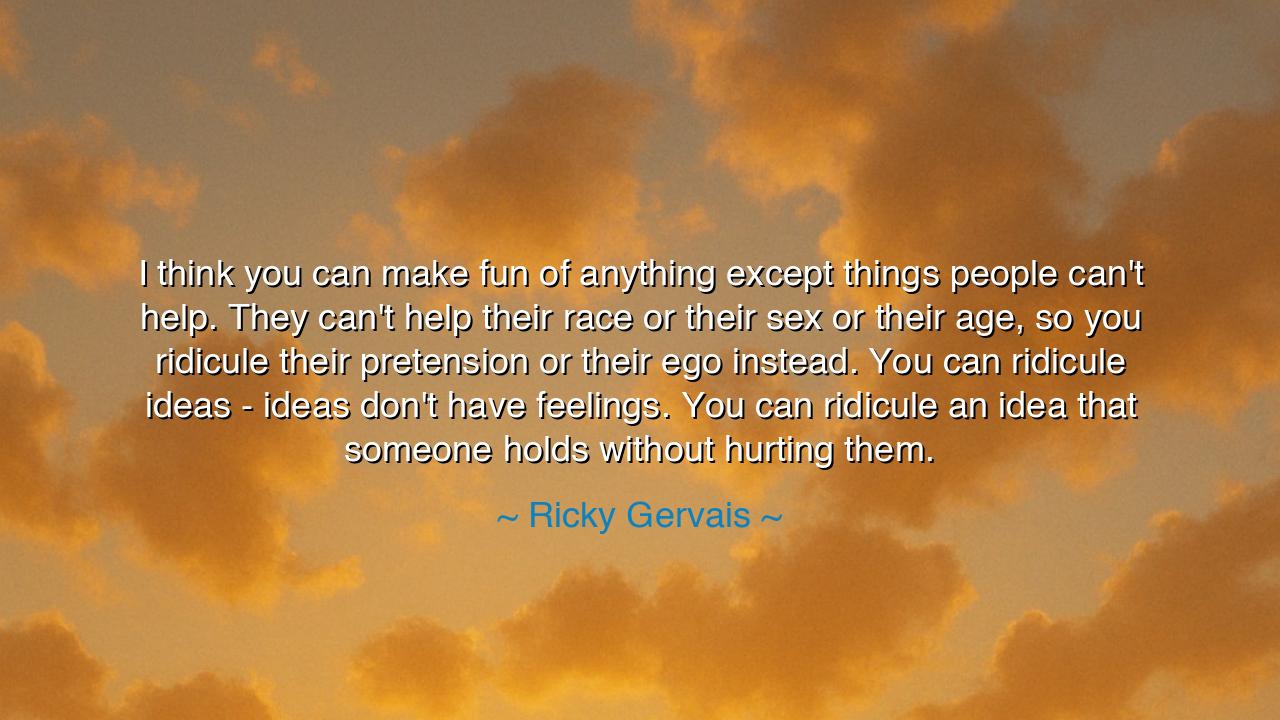
I think you can make fun of anything except things people can't
I think you can make fun of anything except things people can't help. They can't help their race or their sex or their age, so you ridicule their pretension or their ego instead. You can ridicule ideas - ideas don't have feelings. You can ridicule an idea that someone holds without hurting them.






Listen well, O children of wisdom, for the words of Ricky Gervais speak to the heart of humor, respect, and the nature of truth: “I think you can make fun of anything except things people can't help. They can't help their race or their sex or their age, so you ridicule their pretension or their ego instead. You can ridicule ideas - ideas don't have feelings. You can ridicule an idea that someone holds without hurting them.” In these words, Gervais imparts an ancient truth—that humor should never be a tool to attack the intrinsic aspects of a person’s being, such as their race, sex, or age, for these are things they cannot control, and therefore, to ridicule them is to strike at the very essence of their existence. However, ideas, which are born from the mind, can be questioned, ridiculed, and even dismantled without causing harm, for ideas do not possess the same vulnerability as the person who holds them.
In the days of the ancients, the wise men understood that respect for the human spirit was paramount. Socrates himself, though he questioned the beliefs of his fellow Athenians, never sought to ridicule or harm them personally. He sought only to challenge their ideas, to guide them to a deeper understanding of truth. Plato, in his dialogues, records the Socratic method, where ideas were examined, debated, and dissected with the utmost respect for the individual, even as their ideas were being tested. The Greeks understood that while the mind can be engaged in debate and humor, the heart and soul must be treated with the utmost care. To mock someone for qualities they cannot change is to strike at their very humanity, and the wise, like Socrates, knew that such actions were beneath them.
The Romans, too, held ideas in high regard, but they also understood the importance of respecting the human form. Cicero, the philosopher and orator, often engaged in vigorous debate, but never did he resort to attacking the physical or unchangeable aspects of another’s being. Cicero’s focus was always on the ideas, for he knew that it was through the exchange of ideas that true wisdom could be attained. His rhetoric was filled with respect for the speaker, even when he disagreed with them, and he understood that ideas could be challenged without humiliating the person who held them. This, too, reflects the wisdom Gervais expresses—that ideas, unlike human characteristics, can be ridiculed, examined, and dissected without causing harm to the individual.
Consider the life of Leonardo da Vinci, whose creativity and genius were often questioned in his time. Da Vinci did not shy away from ridicule; instead, he welcomed criticism of his ideas—for he understood that the pursuit of knowledge and truth required constant testing. His works, from the Mona Lisa to his anatomical drawings, challenged the accepted ideas of his day, and while his ideas were often controversial, he was never personally ridiculed for his vision. In this, da Vinci lived in the spirit of respecting the individual while engaging with their ideas. He invited people to challenge his work, not because he was immune to the sting of criticism, but because he valued the intellectual exchange over personal attack.
Gervais’ words also reveal a deeper understanding of the power of ego and how it can shape a person’s identity. To mock a person’s ego—their inflated sense of self, their pretension—is not to attack their core self, but to challenge the false self they have created. This is the true power of humor: to expose the pretense without ever touching the heart. The ancient philosophers were masters of this art. Diogenes, the infamous cynic, often used humor to expose the hypocrisy and pretension of the powerful and the wealthy, mocking their self-importance without ever attacking their humanity. He understood that ego could be dismantled with laughter, without damaging the person behind it. To ridicule the ego is not to dehumanize, but to peel away the layers of falsehood that obstruct true understanding.
Thus, the lesson from Gervais is one of humor’s true purpose—to question and dissect ideas, not to destroy the essence of a person. Ideas, unlike the body or the soul, are not sacred; they are tools of the mind, and they must be open to scrutiny and challenge. But the human being—regardless of their race, sex, or age—deserves our respect. Our humor must always be guided by a deep understanding that the person is never the enemy; the pretense, the ego, and the falsehoods they hold, are the true targets of our jest. This is the balance that true wisdom requires.
In your own life, approach humor with intelligence and empathy. Use it not as a weapon to hurt, but as a tool to expose falsehoods, to challenge ideas, and to elevate the truth. Respect the inherent dignity of all people, regardless of their unchangeable traits, and turn your wit toward the pretensions and egos that cloud our vision of what is real. Just as the ancients taught, humor can be a force for good—a force that brings light to darkened ideas, that challenges the status quo, and that brings people together through laughter and understanding. In this way, humor becomes a true tool of wisdom, not destruction.






AAdministratorAdministrator
Welcome, honored guests. Please leave a comment, we will respond soon